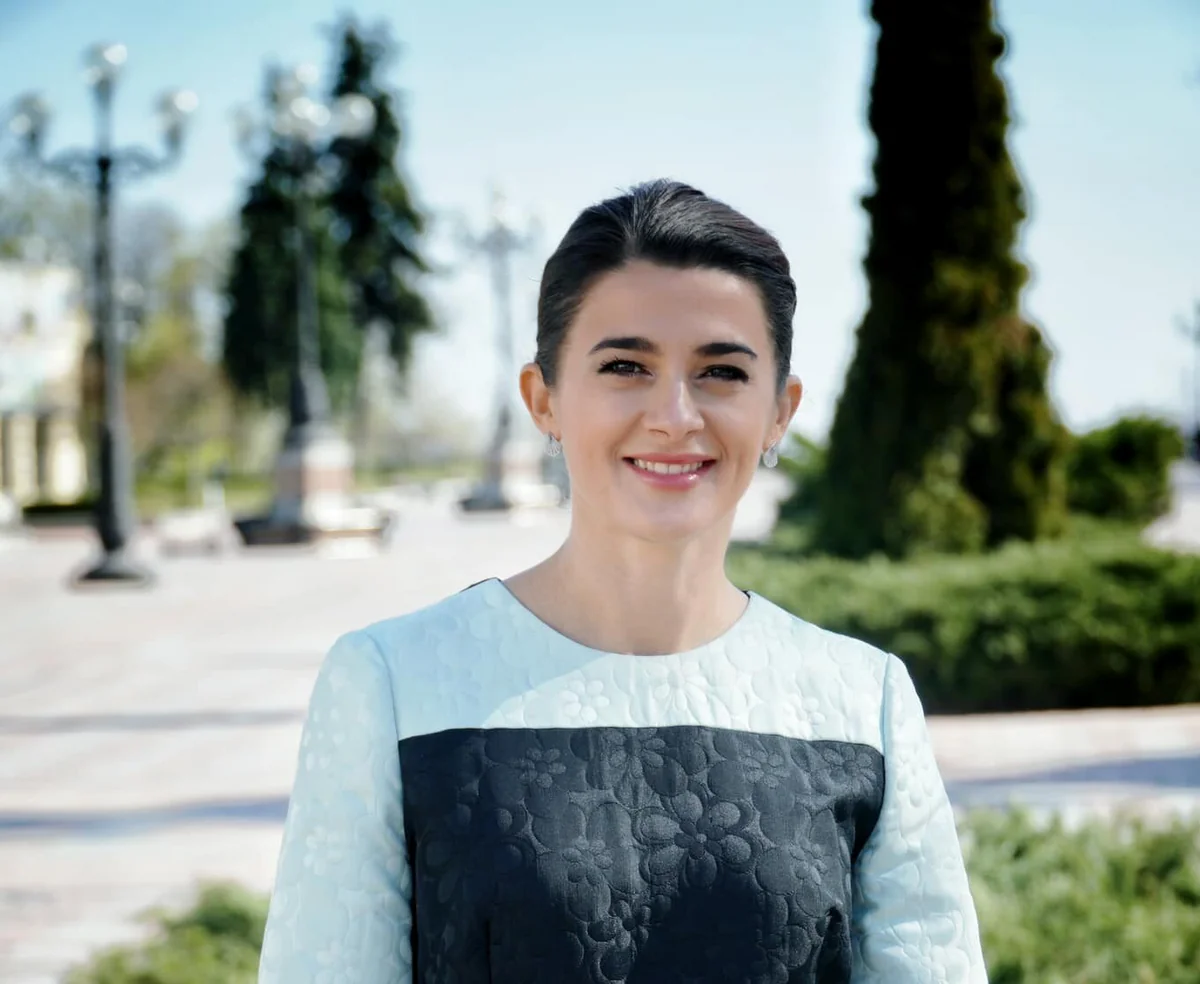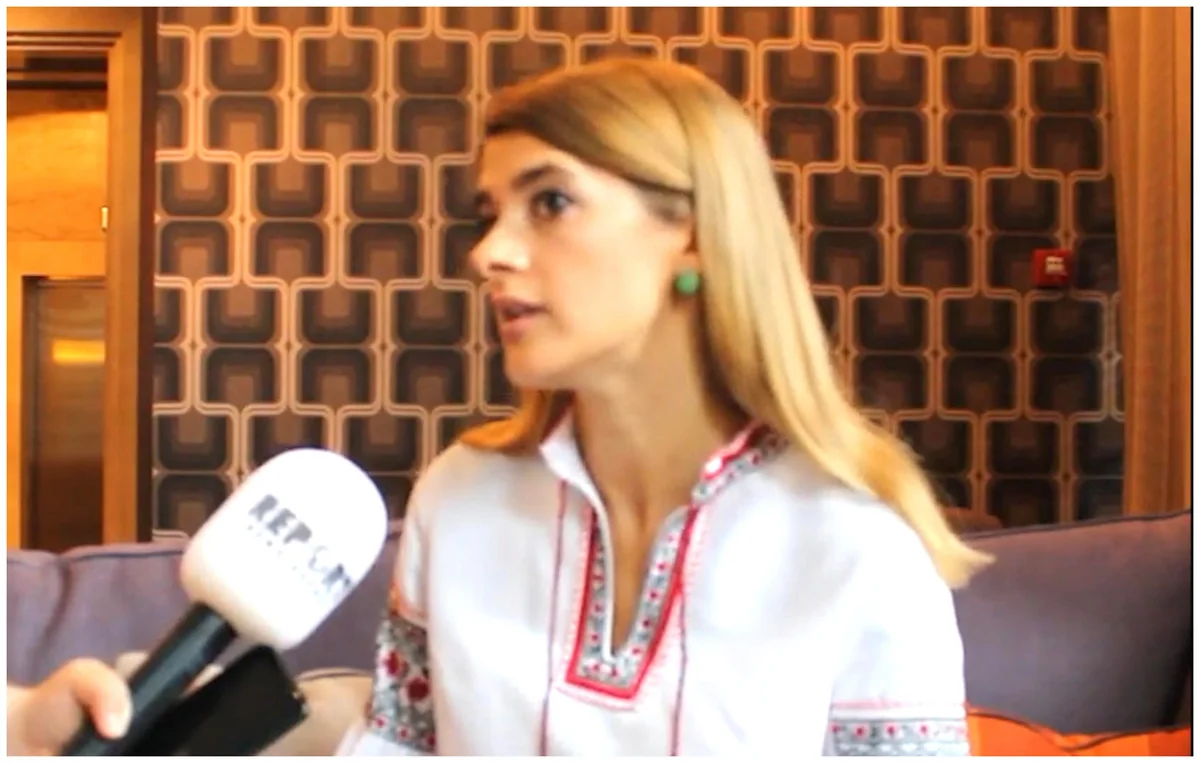Ukrainian MP: Interesting to learn from Azerbaijan’s successful experience - INTERVIEW
- 30 June, 2021
- 10:51

Eastern Europe bureau of Report presents an interview with Ukrainian MP Larysa Bilozir:
- Decentralization is one of the areas of your activity in the Verkhovna Rada (Ukrainian Parliament). At what level is the solution of problems in this area in Ukraine? How is the exchange of experience with Azerbaijan taking place in this area?
Obviously, the reform of decentralization is one of the critical issues and, in principle, probably the only successful one in Ukraine. To date, we have entirely reformed the administrative structure. If earlier we had more than 400 districts, today there are 136 districts, including the temporarily occupied districts. These are 1,470 communities. In fact, since 2014, voluntary decentralization has been taking place for seven years. That is, we allowed villages and small towns to unite voluntarily. This was a success because money, decisions, and responsibility were transferred to the localities. In principle, we looked at how the communities and the people who live there can manage their territories, decide what to finance, and not so that Kyiv chooses what they need. Previously, heads of administrations had to go to Kyiv and ask for financing there. Now they have received a resource, the taxes determined on the income of individuals are 60 percent. It is essential, and they managed to receive also an infrastructure subvention. We saw that these communities began to develop, and people have become more active. The Soviet system began to wither away, respectively, after seven years, it was decided to do it not voluntarily, but as administrative means, and on October 25 last year, elections were held on a new basis. Today is not an easy time. We can say it is a little chaotic because they have to change the legal form, the right to take up a position, transfer all bodies from district administrations, take ownership of, for example, camps, schools, kindergartens. These are all separate legal entities, and they must be re-registered. Of course, it was hard. Today it is already becoming easier. The communities are taking over even the district hospitals. This is also a difficult question. It is challenging for them financially now, but it seems that this means abandoning the Soviet system.
We have been working on this reform for seven years together with the European Union. This reform is unique because we didn’t copy it from European countries. It was developed and implemented uniquely, based on the experience of Ukraine and by the Ukrainians themselves, albeit with the help of the Germans, the Poles - they have an excellent experience. Sweden helped us a lot, and it financed us. There were a lot of programs. I am the head of the subcommittee on administrative services and administrative procedures. I would like to note that Azerbaijan already has a law on the administrative process, but we don’t. The administrative procedure is when relations between the state and citizens are regulated. When they cannot refuse you something or recalculate your pension, it’s when they explain everything to you. We don’t have this yet.

This law is now in the second reading. We hope that as Azerbaijan and European countries, we will accept it because we need to protect a citizen, business from lawlessness of officials who may refuse to issue some certificate may send somewhere for documents. It shouldn’t be like that.
In principle, we are now working with the administrative services center (ASAN service). Here, too, there is a lot to learn from Azerbaijan. We saw that everything is taking place in one center, i.e., you have all services, not only administrative but also social ones provided in one place. Even as far as the police are concerned, I mean the issuance of driver’s licenses, passports - you have everything in one place. Even utilities can be paid there in advance. Everything is in one place, and you don’t have to walk through different structures. We also have administrative services centers, but we have a small problem - the ministries don’t want to share part of their powers because this is money, receipts, special funds. Our Ministry of Justice and the Ministry of Internal Affairs don’t really want to do this, and we force them by law so that they would register death, birth, and marriage in the rural council and so that people wouldn’t have to go to the bodies of the Ministry of Justice.
You have gone a lot ahead of us, but we are trying very fast to implement this in Ukraine and provide services in one place in the administrative services centers. But we don’t have them in every community. We have a law that I proposed and adopted - that in three years, every community, rural and urban one, should have these centers to provide administrative services. We should do it so that services would be closer to people so that it would be comfortable to receive them so that they wouldn’t stand in queues so that all would be easy. Here, of course, we are adopting the experience of Azerbaijan because you have established this very well. I would like to go to Azerbaijan and see how it works and take, perhaps, representatives of ministries who don’t want to give these services to the localities, so that they can see how cool it works, how convenient it is for the citizens of the country when everything is speedy and easy. This is the image of the state. A citizen of a country perceives the state at a level that services are provided there. This is the image of the state, the community. You have state bodies. We have community bodies - they are being created at the community level, so I would be interested to see how these services are provided in Azerbaijan. Next year, I will definitely find an opportunity, and together with the members of the subcommittee, we would like to see everything with our own eyes.

- What kind of activity is there in the Ukrainian-Azerbaijani relations in the areas you are engaged in? Are any new steps expected in ties between the two countries in the areas you supervise? In general, how do you assess the inter-parliamentary relationship between the two countries in these areas?
- Azerbaijan has always been a friendly country. By his decree, the President identified ten strategic partners, and Azerbaijan is among these strategic partners. This is very important because Azerbaijanis have always been our friends. We have always had friendly relations and established profound economic ties. You have a vast Ukrainian diaspora, and the same thing in Ukraine, we have a sizeable Azerbaijani diaspora. In principle, Azerbaijan is indeed a strategic partner in the South Caucasus and the most important here. Of course, I would like our countries to work more closely in the economic sphere. I know that today Ukrainian products are top-rated in Azerbaijan, Ukrainian grocery chains are opening, and we also like your products very much. Many historical moments unite us. In your case, this is temporarily occupied but already de-occupied Karabakh, and in our case, this is occupied Crimea, Donbas.
In principle, it seems to me that we understand each other perfectly. As a member of the Parliamentary Assembly of the Council of Europe, I would like to say that we have support from your delegation when the questions of the temporarily occupied Donbas are heard, and you have our support. As for Azerbaijan, last time in April, the issue of Armenian military prisoners was somehow brought up on the agenda, although your side very clearly stated that these are terrorists who were detained while trying to attack cities. These issues are fundamental on the agenda, they need to be brought up to the EU, but I liked that you have a very strong delegation. Some new deputies represent Azerbaijan. They fought like lions. I am also a member of the migration committee in PACE, and I remember - I have chills - when your delegation brought the albums that they compiled, which shows what a humanitarian disaster it is, how many refugees and how much grief it brings to people.
In fact, sometimes Europeans may be far from it. For many years, the issue of Azerbaijan has not been ignored but postponed. Everyone sympathized, confirmed that they respect the territorial integrity of Ukraine and Azerbaijan, but there were few actions, and you had to deal with it yourself. This has probably made you stronger, and this is what we need to learn from you. It helped you get back your territories after all. I remember these albums and how strong the words of your delegation’s representatives are that these are millions of lives of people who cannot return to where they grew up - to Karabakh. I know that a lot of people died. My condolences. But drones were involved, completely new types of equipment were involved, and here Ukraine should also learn from this experience because we all understand that no one but us will liberate our territories. Even if Europe and NATO are talking about Ukraine’s prospect of joining NATO, we are not in NATO, and you are not in NATO, either. We must rely on our strength, and the most important thing is to invest in the armed forces of Ukraine, in our army. This is also an essential aspect of economic development. Therefore, we have experience. There is something to see for us in Azerbaijan and for you in Ukraine. Cooperation and good neighborly relations are crucial. Consequently, I think that many things unite us with Azerbaijan, a similar history, especially a new history. I think it is very interesting to learn from the experience that has been successfully implemented in Azerbaijan.

- What can you say about regulating children’s rights in Ukraine as one of the areas you supervise? For example, how many children’s rights are violated in Ukraine, according to statistics?
- In fact, the question is really very important. I am a member of the special commission under the temporary investigative commission, which was formed in the Verkhovna Rada and deals with protecting children with disabilities with special educational needs. This is the status of children who cannot study in a regular school, inclusion doesn’t suit them, they need special schools, sanatorium schools, and we are in the process of deinstitutionalization when a child cannot live in a boarding house, he or she must be in a family. The members of our commission and I believe that this is a wrong reform. It should concern orphans, children without status. They need to look for families. But since here we have no success, some ‘reformers’ decided to switch to special schools. I don’t know if there are special schools in Azerbaijan for children with deafness, blind children, children with cerebral palsy, and autism. These children may not always be able to study in ordinary or inclusive schools. In Ukraine, they are trying to close these schools and show that the issue is solved because these children are now with their parents. But this is a bit of a wrong direction. We are now fighting to remove special schools, sanatorium schools from this process of deinstitutionalization. There are orphans, and there are children with a special status who need to look for families. It is clear that boarding houses are a thing of the past, we need to move away from this, but not all children can find a family. It is challenging for seriously ill patients to find parents, and only foreigners take such children. Ukrainians are not quite ready for this because they need special treatment, a particular type of care. Today, during the pandemic, all these problems regarding children are especially exposed. This pandemic also showed us violations of children’s rights. Today it is a question of a breach of children’s rights and freedoms and interests, and it is on the agenda in the Verkhovna Rada. We fix a lot of mistakes. There are also sanatorium schools where children need to be treated. This reform has gone a little in the wrong direction, it is very European, but you cannot just take the experience and transfer it. You have to be realistic and look at what realities are in the country. Today we are working on these problems, protecting children’s rights with special educational needs and their parents, whose rights are also violated.
- Do you have statistics on children who died due to the war in eastern Ukraine from 2014 to the present day?
- It is more than 200 children. We have adopted a resolution this year, according to which June 4 will be celebrated as the Day of Remembrance of Children who suffered from the military operations in eastern Ukraine. These are innocent children who have become hostages of the situation that we have in the east today - already seven years of undeclared war. This is the worst thing when children suffer from conflict. I think this question is the most painful one, and it isn’t easy to talk about it.
